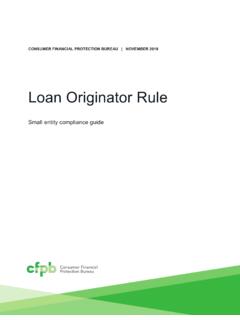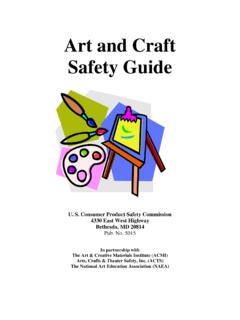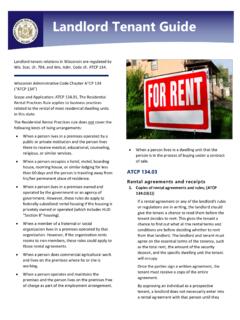Transcription of A quick guide to competition and consumer protection …
1 1A quick guide to competition and consumer protection laws that affect your businessA quick guide to competition and consumer protection laws that affect your businessA quick guide to competition and consumer protection laws that affect your businessUnderstanding the laws that affect you is an important part of running a successful business. This is a quick guide to the main rules covering how you compete, how you treat your customers and how you sell. Contents n The competition Act an introduction ..2 n competition law what is prohibited? ..3 n Dealing with anti-competitive behaviour ..5 n Cartels ..6 n n Market studies ..9 n Do you offer credit? ..11 n Advertising credit ..12 n Comparative and misleading advertising ..15 n Unfair commercial practices.
2 17 n Issuing contracts ..19 n Selling online or at a distance ..21 n Estate agency ..23 n consumer codes of practice ..25 n Who to contact at the OFT ..262 competition law an introductionThe law aims to promote healthy competition . It bans anti-competitive agreements between firms such as agreements to fix prices or to carve up markets, and it makes it illegal for businesses to abuse a dominant market need to be aware of the main rules to avoid breaking the law or becoming a victim of others anti-competitive are heavy penalties for infringements. Offenders can be fined, disqualified from being a director and, in some cases, sent to competition law, mergers between businesses can also be prevented if they might reduce competition , and uncompetitive markets can be investigated through market quick guide to competition and consumer protection laws that affect your businessCompetition law what is prohibited?
3 Anti-competitive agreementsThe competition Act 1998 (the Act) prohibits anti-competitive agreements between businesses. In particular, you must not: agree to fix prices or terms of trade, for example agreeing price rises with your competitors agree to limit your production to reduce competition carve up markets or customers, for example agreeing with a competitor that you will bid for one contract and they will take another discriminate between customers, for example charging different prices or imposing different terms where there is no difference in the circumstances of agreement that prevents, restricts or distorts competition is covered (not just the types of agreement listed above). An agreement could be formal (such as legally-binding contracts) or informal (such as unwritten gentlemen s agreements ).
4 The Act mainly applies to agreements between businesses with a significant combined market share. But even the smallest businesses need to avoid getting involved in anti-competitive agreements, such as cartels. The OFT can also assess whether an agreement may affect trade between EU member of a dominant market positionThe Act also prohibits abuse of a dominant market position. This mainly applies to businesses that have a large market share, usually 40 per cent or more. 4 Other factors taken into consideration in determining whether a company is dominant include the number and size of competitors and customers and whether new businesses can easily set up in competition . The type of practices that could indicate abuse include charging unfair prices or imposing other unfair trading conditions on customers, limiting production, or refusing to supply an existing customer without an objective reason.
5 The OFT can also assess whether an abuse may affect trade between EU Member OFT has extensive powers to investigate suspected breaches of competition law and take action. Penalties can include fines of up to 10 per cent of a company s annual worldwide turnover. Also, directors can be disqualified, given an unlimited fine or even addition to any penalty imposed, customers and competitors may be able to privately sue companies that break the law for any losses they have suffered due to the anti-competitive quick guide to competition and consumer protection laws that affect your businessDealing with anti-competitive behaviourWe rely on complaints to help us promote healthy competition and protect the interests of consumers and fair-dealing businesses.
6 If you suspect a competitor, supplier, customer or any other business is infringing the law, you should contact the OFT with your are a number of signs that may mean a business you deal with could be breaking competition law. These include: a supplier prevents you from selling their products at a discount a long-standing supplier decides, for no apparent objective reason, to stop supplying you you receive quotes from various suppliers that are surprisingly and unusually similar you enter a market and a major competitor responds by charging extremely low prices that you suspect would not cover its a business appears to be behaving in any of these ways, it does not necessarily mean it has breached the law. In some cases the behaviour may be legitimate.
7 However, you can contact the OFT for advice on whether the matter is likely to raise competition law issues and if appropriate, we can explain how to submit a formal are the most serious form of anti-competitive behaviour. They are agreements between businesses not to compete with each is a criminal offence for individuals to engage dishonestly in the most serious cartel activities: price-fixing market-sharing bid-rigging agreements to limit production or supply. These offences carry a maximum penalty of five years imprisonment and/or an unlimited fine. If you think a business you deal with is involved in a cartel, you should contact the OFT by telephone, email or in writing giving us as much information as you can to support your participationIf you alert the OFT to a cartel you are or have been involved in, you may be dealt with under the leniency programme.
8 Businesses may be given total or partial immunity from fines and individuals may be given immunity from qualify for leniency, you have to meet certain conditions including admitting participation in the cartel, cooperating with the investigation and stopping your cartel activity quick guide to competition and consumer protection laws that affect your business8 MergersWhen two businesses merge or form a joint venture, it may reduce competition . Mergers that could substantially lessen competition can be prohibited or have certain conditions OFT is responsible for investigating mergers in the first instance. If we believe a merger might result in a substantial lessening of competition , we can refer it to the competition Commission for an in-depth can only be investigated if they meet certain criteria.
9 Crucially, either the business being taken over must have a turnover in the UK of at least 70 million, or the merged entity would have to have a share of 25 per cent or more of the supply of a particular category of goods or services in a substantial part of the UK. As a result, many mergers between smaller businesses are not subject to investigation. If you are involved in a merger of any size, you may need to seek legal quick guide to competition and consumer protection laws that affect your businessMarket studiesThe OFT studies markets that do not appear to be working well for consumers. Our role is to establish what the reasons are for this and publish the results. Possible results of market studies include: enforcement action by the OFT a more detailed investigation by the competition Commission recommendations for changes in the law work to educate consumers a clean bill of health for the small businesses are unlikely to be directly involved in market studies.
10 However, you or your industry body may wish to suggest ideas for market studies if you believe there is a lack of healthy competition in your sector or a sector you deal with. Visit our website, ( ) where there is a form that you can complete to suggest a market study. The information that we need from you includes the nature of the problem for consumers and reasons why the problem and the market are important. 1011A quick guide to competition and consumer protection laws that affect your businessDo you offer credit?If your business sells goods or services on credit or lends money to consumers, you almost certainly need to be licensed by the OFT. Debt collectors, debt advisors or negotiators, credit reference agencies and businesses that offer goods for hire or leasing may also need to be licensed.



















